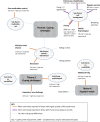Patient coping strategies in COPD across disease severity and quality of life: a qualitative study
- PMID: 27629237
- PMCID: PMC5024412
- DOI: 10.1038/npjpcrm.2016.51
Patient coping strategies in COPD across disease severity and quality of life: a qualitative study
Abstract
Quality of life (QoL) has a weak relationship with lung function (LF) impairment in COPD; some cope well despite poor LF, whereas others suffer disproportionate QoL impairment despite well-preserved LF. Adjuvant non-pharmacological interventions such as rehabilitation and psychological/behavioural support may help if acceptable and targeted appropriately, but they are under-used and sometimes declined by patients. This study aimed to explore and understand variations in experiences and coping strategies in patients with different severities of disease and disease-specific QoL. Thirty-four participants were purposively sampled across a spectrum of LF and QoL impairment, to cover a grid of sub-groups ('very severe LF, good QoL', moderate LF, poor QoL' and so on). Semi-structured interviews, digitally recorded, were analysed by thematic analysis. Data saturation was achieved. Four themes emerged: symptom impact, coping strategies, coping challenges and support needs. Most of them described using multiple coping strategies, yet over half reported significant challenges coping with COPD, including psychological impact, non-acceptance of diagnosis and/or disease progression, effects of co-morbidities and inadequate self-management skills. Approximately half of the participants wanted further help, ideally non-pharmacological, across all LF impairment groups but mainly with lower QoL. Those with lower QoL additionally reported greater psychological distress and greater use of non-pharmacological support strategies where accessible. Patients who develop effective coping strategies have a better QoL independent of objective LF, whereas others cope poorly, are aware of this and report more use of non-pharmacological approaches. This study suggests that severely impaired QoL, irrelevant of lung function, is a powerful patient-centred indication to explore the positive benefits of psychological and behavioural support for distressed COPD patients.
Figures
References
-
- Sin, D. D., Anthonisen, N. R., Soriano, J. B. & Agusti, A. G. Mortality in COPD: role of comorbidities. Eur. Respir. J. 28, 1245–1257 (2006). - PubMed
-
- Royal College of General Practitioners. Morbidity Statistics from General Practice. Third National Study 1991–1992 (Office of Population Censuses and Surveys, Department of Health, 1995).
-
- Office of Population Census and Surveys. Morbidity statistics from general practice: fourth national study 1991–1992 (Her Majesty’s Stationery Office, 1995).
-
- Kunik, M. E. et al. Surprisingly high prevalence of anxiety and depression in chronic breathing disorders. Chest 127, 1205–1211 (2005). - PubMed
-
- Moore, M. C. & Zebb, B. J. Functional status in chronic obstructive pulmonary disease: the moderating effects of panic. Int. J. Rehabil. Health 4, 83–93 (1998).
MeSH terms
LinkOut - more resources
Full Text Sources
Other Literature Sources
Medical



